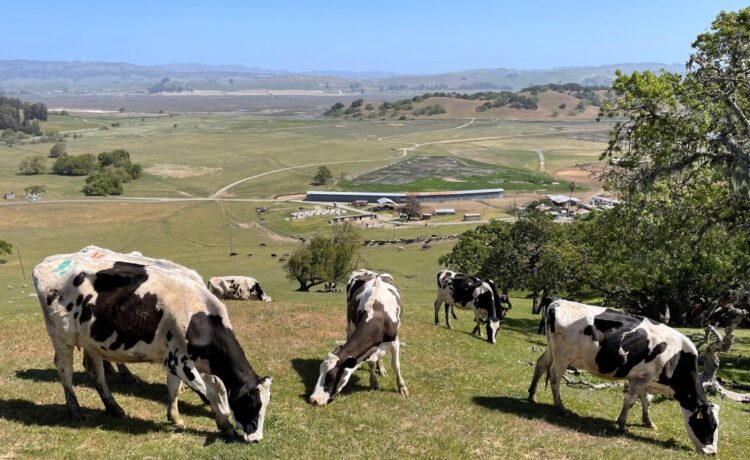Dairy cows graze at the Corda Family Ranch in rural northeast Marin County on Tuesday, April 13, 2021. Dairy operations ended in 2022. The family now leases much of the ranch for beef cattle grazing. (Sherry LaVars/Marin Independent Journal)
Marin County supervisors have approved grants totaling more than $2.9 million for two new agricultural conservation easements.
The money for the easements come from Measure A revenue, a quarter-cent sales tax first approved by Marin voters in 2012 and renewed in June 2022. Ten percent of the revenue generated by the tax goes toward helping to underwrite Marin Agricultural Land Trust (MALT) easements, which guarantee the land will be used for agricultural purposes in perpetuity.
The county underwrites half the cost of easements and MALT uses private donations to cover the other half.
A grant of over $2.5 million was approved on April 16 to protect the 903-acre Corda Family Ranch, one of the largest ranches in the county, and a grant of over $419,000 was approved for an easement on the 344-acre Hicks Mountain Ranch. Hicks Mountain, one of the taller peaks in Marin County, is on that ranch.
Both ranches are owned by the Corda family, which has conducted agriculture on the properties for more than a century.
“My great grandfather bought the ranch in 1912, there’s a lot of my family’s blood and sweat in this soil,” Bob Corda said in a statement issued by MALT. “We’re blessed to have been born into the privilege of the land’s ownership, and to have inherited the responsibility of its stewardship — it’s a lot of work and you have to love it.”
In 2022, the Corda family ended its dairy cattle operation, which it had operated for decades. Like other dairy operations in Marin County, it fell victim to drought, a slumping economy and less supportive federal policies. The family now leases much of the ranch for beef cattle grazing.
Craig Richardson, a planner with Marin County Parks, told supervisors, “At this point there are several family members on title and one or more of them no longer want to be involved in the property so they need to be bought out.”
Richardson said the alternative would be for the family to sell the land.
In his staff report to supervisors, Chris Chamberlain, assistant director of Marin County Parks, wrote, “The property faces significant development pressure by being less than five miles from developed residential communities in San Marin and northern Novato which feature rural residential, low density residential and medium density residential zoning designations.”
Chamberlain added that the MALT easement would “extinguish the remaining residential development rights.”
The Hicks Mountain Ranch is operated by the Dellingers, part of the larger Corda family. The Dellingers are best known for Hicks Mountain Hens, which sells pasture-raised eggs from a farmstand just up the road from the Marin French Cheese Co.
The business got its start as Bill Dellinger’s boyhood 4-H project.
Richardson said, “It’s one of the unique opportunities we have in West Marin to purchase our food and at the same time see the animals that produce it.”
Bill Dellinger’s mother, Angela Dellinger, the ranch’s current owner, said, “This opportunity with MALT gives a strong family the chance to protect a great ranch.”
The Conservation Lands Network has deemed nearly 92% of the Hicks Mountain Ranch and 373 acres of the Corda Family Ranch as essential for biodiversity.
The Corda Family Ranch includes more than 600 acres of coastal grasslands, dense oak woodlands and creekside habitats. The ranch’s pastures act as natural filters, purifying rainwater that eventually feeds into Novato Creek. Water from the ranch ends up in Stafford Lake, which serves as a source of water for nearby Novato residents.
Richardson said, “Almost 4 miles of Novato Creek are contained within this property, and the great thing about this conservation easement is that it will provide protections for that creek as it relates to the agricultural uses on the property.”
Two primary residents are on the property and one farmworker residence. A number of barns are also on the site, including a hay and calf barn and a sheep barn, in addition to other ancillary buildings and sheds.
The Hicks Mountain Ranch includes about 134 acres of grasslands. The remaining 210 acres are a mosaic of coast oak woodland and California bay forest. The ranch has been designated as a “priority conservation area” by the Bay Area Greenprint and as “critical regional wildlife habitat linkage” by the Conservation Lands Network.
Water from three intermittent streams and five springs on the ranch drain into the headwaters of Arroyo Sausal, which feeds into the Soulajule Reservoir. The ranch has three small residences, including a single-family home and several barns and outbuildings.
At the end of the Board of Supervisors’ public hearing, a member of the public asked if there was any evidence to support the idea that ranching is essential for the maintenance of biodiversity.
Marin County Parks Director Max Korten said that while it might seem counterintuitive, studies done by the East Bay Regional Parks District and others have shown that “a thoughtful approach to grazing increases the biodiversity of native plants and wildflowers.” Korten said ground-nesting birds, local amphibians and other wild animals and protected species also benefit.
“A lot of habitats in Marin County evolved around regular disturbances,” Korten said.
Indigenous inhabitants used fire to clear the land, and herds of elk grazed the hills, he said.
“So by carefully managing grazing,” Korten said, “our agricultural partners are actually able to replicate some of those disturbances.”















